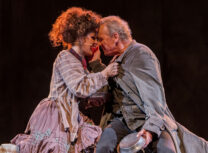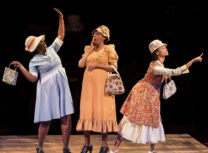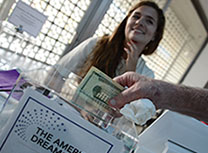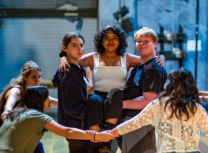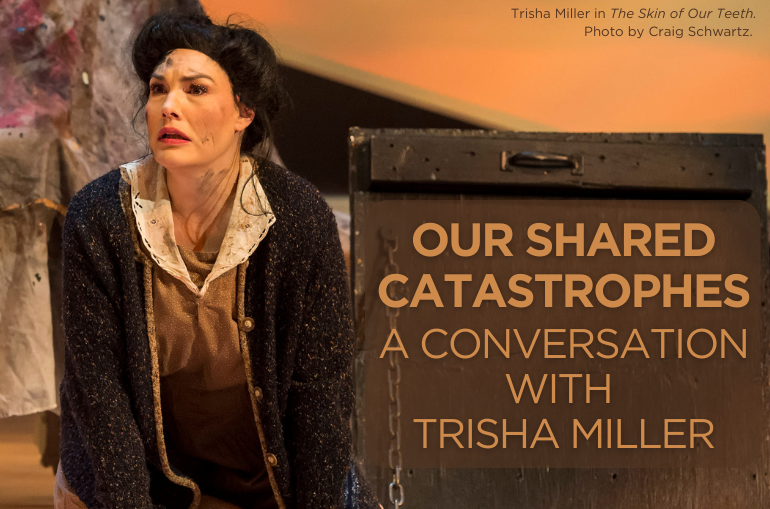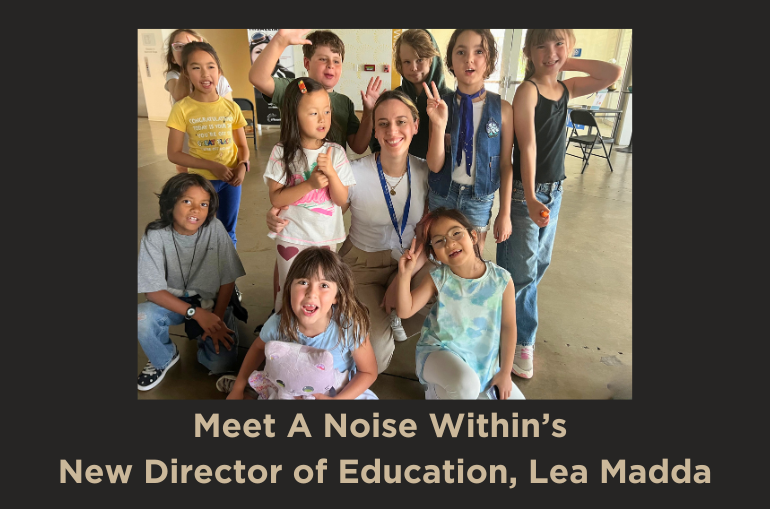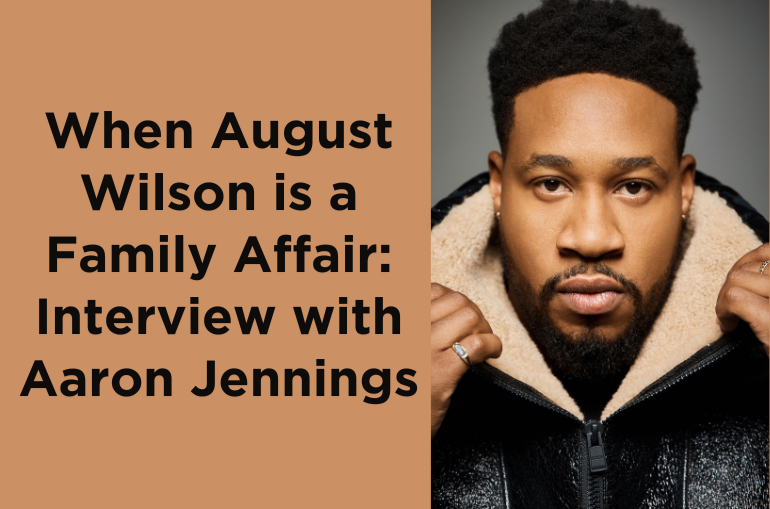Q&A With Erika & Bernard
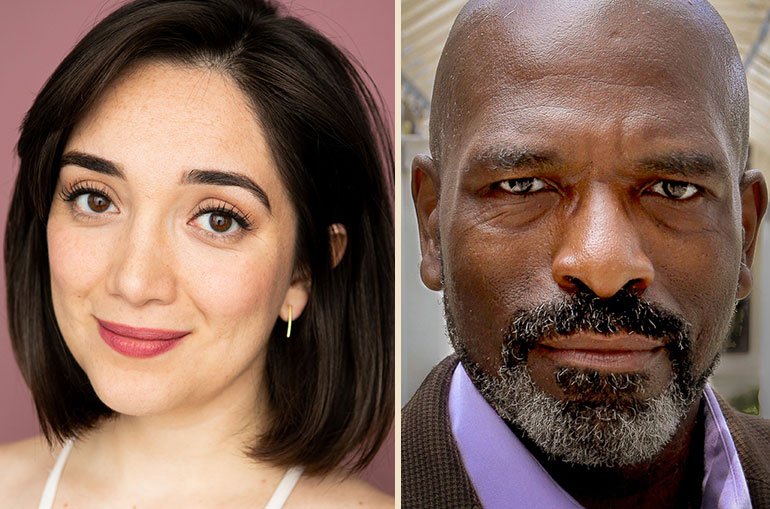
By A Noise Within
January 31, 2022
A no-name woman with healing abilities. A powerful but ailing king. Their first meeting sets the events of Shakespeare’s All’s Well That Ends Well into motion. Erika Soto (she/her), who plays Helen, and Bernard K. Addison (he/him), who plays the King of France, got together to talk about their characters and how their interactions speak to the themes of the play.
How would you describe the first meeting between Helen and the King of France, and how does their relationship dynamic shift?
Bernard: There’s status involved, since I’m a king. I’m told that someone is here to help, a woman doctor. For people who are terminally ill or dealing with a chronic illness, at some point you give in and say, “I might as well make peace with it instead of look for a cure and spend all this money only for nothing to change.” You tell yourself to make the best of it and give blessings to the people in your life. Hope is a dangerous idea, from the king’s point of view. He’s gone that route. So, when she comes in and offers hope, it’s very dangerous and scary.
Erika: It’s the same for Helen because the king is her hope for the love she desires, and it’s also a huge risk for her. She’s gambling his life and her own if she can’t cure him. They couldn’t be more immediately necessary to each other, a king and a no-name girl. It’s such a moment of courage for both of them to meet and see one another.
B: In the play, I’m noticing there are lots of conversation about honor. The king’s honorable generation is gone. He hopes it’s in Bertram. He says, “Thy father’s moral parts mayst thou inherit too,” but he doesn’t know if Bertram has. Then the king finds the honorable in this woman. This is important to remember when he presents the pageantry of men to her because, as he sees it, she deserves the best. When Helen chooses Bertram and he shows resistance, it’s about honor. The king says his honor is at stake and he has the power to do this, so he is going to commit to it. That’s where the bond happens between Helen and the king: to recognize the duty that one has in sustaining a relationship. He doesn’t tell Helen to pick someone else; he chooses duty.
How does the dynamic of their meeting reflect the time of the play and our time now?
B: The statuses are really different now, of course. There’s a generational dynamic. You meet someone that could be a father figure or a mentor, someone you can learn from and respect. For me, when I teach, it’s important that I am open to new things with students. It’s a shared relationship filled with respect.
E: There’s something to be said about the time and the limitations that women had in terms of sovereignty over themselves. Helen finds a way to do something that is unheard of: a woman of no name, status, or wealth will choose her own husband. Helen has to use her skills as leverage to get what she wants. It’s not like being a man who can go for what he wants, like Bertram. Actually, in this play, Bertram doesn’t have a choice. Helen fights so hard that it takes a choice from a man, which makes you gasp at the notion, but that’s how it was and is for women. Maybe it’s a complicated play for the feminist agenda, or maybe it isn’t! This play says a lot about status and power and is reflective of where we are now.
This scene between the king and Helen is powerful to me because it feels like the setup for a paternal relationship. Helen just lost her father six months ago. A moment that gets me as Erika is where the king steps into the father’s role as she chooses her husband and tells her he will be here for her. As someone with a complicated relationship with my father, it gets me emotional. I find so much value with connecting with strong, supportive, loving men in the world around me. You can be mothered and fathered by people who are not biological. I think that Helen and the king have this relationship. Bernard, something you said that was beautiful was the responsibility you have to follow through with your commitments. Commitment means something in your relationship.
How does healing factor into your characters’ interaction? How does it factor into the play as a whole?
B: The king has a new lease on who he wants to be. In the first scene, he is still lucid and making decisions, but he has experienced physical deterioration that is suddenly restored. Physical healing is the primary healing.
Later, when he is dealing with Bertram, he becomes the person that helps others move on with life. When he tells Bertram that “to the brightest beams distracted clouds give way,” he is saying “I’m letting you back into the fold.” If you are committed to somebody, you keep finding ways to make things work. I think that’s what the king learns from Helen: how to make things work. She’s the expert on making things work.
E: Beyond physical healing, what other healing happens? I think of forgiveness, acceptance, understanding. So much of the play, at least for Helen, is about doing whatever she can to earn and deserve but ultimately just get her love. What does that say about worthiness and fighting for what you want? But it’s complicated. It’s not totally fair or right what she does to get Bertram.
B: I think it’s very fair because of status. He’s of a higher status, which in this world meant you would not be able to achieve him. With this healing ability, knowing what you want, you make it happen by any means necessary on your part.
E: All’s fair in love and war, baby!
B: Everybody wonders why Helen wants someone who doesn’t want her. Sometimes, you have to go past the romantic. Who’s out there that can give me what I want? I don’t see Helen pining or doing self-destructive behavior. I just see Helen going for what she wants.
E: You’re right, Bernard. This is a generalization, but women are raised to question what they want. Is it okay to want? What will people think of me if I want this? Generally speaking, maybe men just go, “This is what I want and I’m going to do it.” Helen has that attitude. And that’s okay – in all of its glorious complexity and messiness.
Is this your first time performing All’s Well That Ends Well? How does it compare to your experience in other Shakespeare plays?
B & E: Yes, it’s our first time.
B: As far as a comparison to other Shakespeare plays, it’s too early to tell. I’m in the king age now and moving into those roles. What I’m discovering with the kings is that the language becomes curlicue. It’s beautiful but tough because the syntax is not the same. The kings like to hear themselves talk, but also, they have a higher education. Shakespeare does make the distinction with royalty and non-royalty with the language.
E: I’ve played a lot of Shakespeare’s ingenues before. I’ve done Miranda, Juliet, and Cordelia, and I think Helen is the first time I feel like I’m graduating into Shakespeare’s leading ladies. As a woman in my early thirties, it’s a transitional period. Youth is whispering, but the womanly wisdom you seek is getting closer. I feel a second coming of age as an actor and as a woman. It’s a great transition between the innocence and naïveté and becoming someone like Deborah Strang as the Countess with the gravitas, weight, and power. It’s this place in the middle where you’re finding your voice and creating community. I’m even doing that now in my personal life. This play has so much sexuality and embodying yourself as a fully formed being with experience—maybe not a ton, but not none. I am glad I was trusted with this role. It feels like a graduation. Eventually, I hope to build up to Shakespeare’s powerhouses, the Lady M’s, the duchesses, the countesses, etc.
What do audiences have to look forward to?
B: It’s beautiful. Audiences will enjoy the visual feast.
E: Agreed. It’s also very funny. A lot of heart is in it. It will be a relief and release for people to come together to laugh and root for love together. It’s a fun ride. It’s a rom-com! A rom-dram-com! Just being together will be great.
B: That was what was great about seeing Seven Guitars. This is going to be the same feeling. Being in the same space is not something to take for granted. That will be the beauty of this piece, people coming together again.
